Nursery Rhymes for Children |
| www.studenthandouts.com > Printable Texts > Nursery Rhyme Worksheets |
Classic nursery rhymes are a wonderful way to immerse emergent readers into new, varied vocabulary, as well as to get them writing. Our free, printable worksheets are designed for use by students in kindergarten through second grade, depending upon the individual student's reading and writing level. Each children's poem is featured on a worksheet that asks students to read, trace, and write the rhyme. Many of the nursery rhymes feature additional worksheets related to the poem. Some even contain learning games, such as printable cards that have students match rhyming words. |
|---|
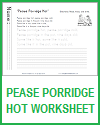 |
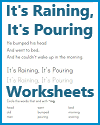 |
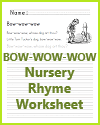 |
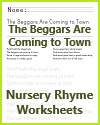 |
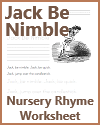 |
||||||
| Pease Porridge Hot | It's Raining, It's Pouring | Bow-wow-wow | The Beggars Are Coming to Town | Jack Be Nimble |
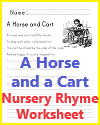 |
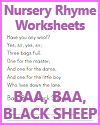 |
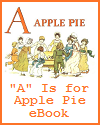 |
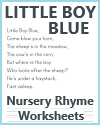 |
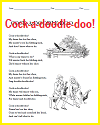 |
||||||
| A Horse and a Cart | Baa, Baa, Black Sheep | "A" Is for Apple Pie eBook | Little Boy Blue | Cock-a-doodle-doo! |
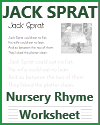 |
 |
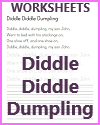 |
 |
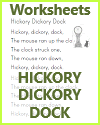 |
||||||
| Jack Sprat | There Was an Old Woman Who Lived in a Shoe | Diddle Diddle Dumpling | A Diller, a Dollar | Hickory Dickory Dock |
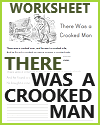 |
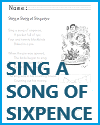 |
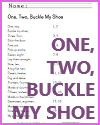 |
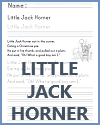 |
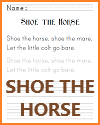 |
||||||
| There Was a Crooked Man | Sing a Song of Sixpence | One, Two, Buckle My Shoe | Little Jack Horner | Shoe the Horse |
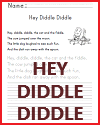 |
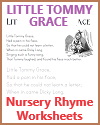 |
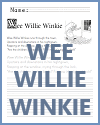 |
 |
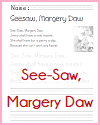 |
||||||
| Hey Diddle Diddle | Little Tommy Grace | Wee Willie Winkie | Rain, Rain, Go Away | See-Saw, Margery Daw |
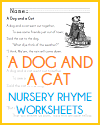 |
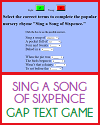 |
 |
||||||||
| A Dog and a Cat | Sing a Song of Sixpence Gap Text Quiz Game | Old Mother Hubbard Rhyming Book |
|
Familiarity with nursery rhymes is one of the building blocks of cultural literacy. Nursery rhymes are an integral component of early learning for several important reasons.
Language Development: Nursery rhymes are rich in language, often containing rhythmic and rhyming patterns that help children develop phonemic awareness. Hearing and reciting rhymes can improve vocabulary, pronunciation, and language comprehension. Phonemic Awareness: The rhythmic and rhyming nature of nursery rhymes helps children recognize and manipulate sounds in words. This is a fundamental skill for later reading and writing. Early Literacy Skills: Exposure to nursery rhymes lays the foundation for early literacy skills, such as phonics and comprehension. It helps children understand that words can be broken down into smaller sounds and that words have meanings. Memory Enhancement: Memorizing and reciting nursery rhymes can improve memory and cognitive skills. This is particularly beneficial as children develop their memorization abilities. 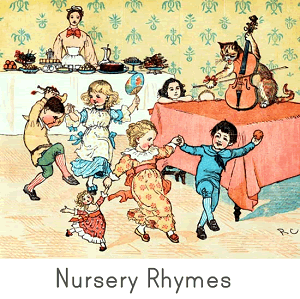 Cultural and Historical Awareness: Many nursery rhymes have historical and cultural significance, introducing children to traditional stories, characters, and values from different times and places. Cultural and Historical Awareness: Many nursery rhymes have historical and cultural significance, introducing children to traditional stories, characters, and values from different times and places.
Social and Emotional Development: Singing and reciting nursery rhymes with caregivers or peers can foster social interactions and emotional connections. It is a form of bonding that can be comforting and reassuring for young children. Listening Skills: Nursery rhymes encourage children to listen attentively to words, sounds, and rhythms. This improves their listening skills and ability to follow instructions. Rhythmic and Motor Skills: Nursery rhymes often have rhythmic patterns that children can clap, dance, or move to. These activities promote coordination, rhythm, and motor skills. Creativity and Imagination: Nursery rhymes often involve whimsical and imaginative themes that stimulate creativity and expand a child's imagination. Early Reading Motivation: Nursery rhymes can be the first exposure children have to the joy of reading and storytelling. They can create a positive association with books and reading. Cultural Connection: Nursery rhymes often connect children to their cultural heritage, introducing them to the traditions and stories of their own culture or those of others. Preparation for School: Early exposure to nursery rhymes can prepare children for school by familiarizing them with the rhythms and patterns of language, making the transition to formal reading instruction smoother. Multisensory Learning: Singing or reciting nursery rhymes engages multiple senses, including auditory, visual, and kinesthetic, making learning more engaging and memorable. Building Confidence: As children become familiar with nursery rhymes and can recite them independently, it boosts their confidence and self-esteem. Teaching Life Lessons: Some nursery rhymes convey simple life lessons, morals, or values. For example, "Humpty Dumpty" can teach about the consequences of actions. Overall, nursery rhymes are a fun and effective way to introduce young children to language, literacy, and culture. They provide a solid foundation for future learning and can instill a love of language and reading from a very early age. We are delighted to offer this collection of free printable nursery rhyme worksheets, to help the little ones in your life as they go on this formative cultural and educational journey. |
| www.studenthandouts.com > Printable Texts > Nursery Rhyme Worksheets |






